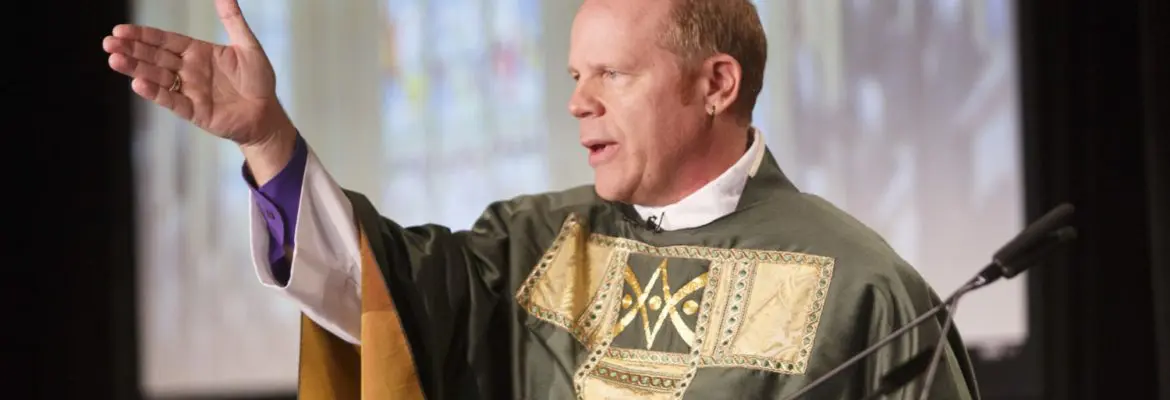
Dear Friends,
What a wonderful Synod that was! As I said at its conclusion on Saturday, it was a complete tonic to be together again, to worship and sing and celebrate and feast and listen and learn and work together as the Body of Christ in the Diocese of Toronto. I have missed being with you all, and “joyful” is the only word I can use to express the feeling of being reunited after four long years apart.
My Charge to Synod was effectively last week’s Friday letter, delivered verbally, and I invite you to read it here if you weren’t present to hear it live. There is a lot in it! But I would love to hear back from you with your reactions.
This week’s letter is a “Monday Letter,” as I write to you today on a very important day, with an important message, and an important liturgical note to you all.
Today is Trans Day of Remembrance and Resilience. Every year on Nov. 20, both nationally and internationally, we mourn all those who have lost their lives as a result of transphobia. That number is shockingly large, and also, we fear, increasing – not declining. Violence against the Trans community is real and abhorrent. Additionally, some Trans people tragically take their own lives from the despair that comes from lack of acceptance. And while anti-LGBTQ2S+ sentiment has been especially prominent in the U.S., the situation in Canada is equally concerning. In September, you’ll remember there were protests, and frightening counter-protests, regarding proposed legislation restricting the teaching of 2SLGBTQIA+ content in schools, or allowing students to change their name or pronouns at school. Experts believe that the current climate will lead to more self-harm and crises of mental health among our young people, where they only wish to be free to explore identity and self-expression, and to grow into the fulness of themselves. School is often their safe space. Research shows only one in three 2SLGBTQIA+ young people feel they live in a supportive home. We know that almost 40% of homeless youth identify as 2SLGBTQIA+; this is not a coincidence.
As the Church, we ought to be a safe, welcoming space also. Anglican Christians believe Jesus preached a gospel of inclusion – that all were welcome, whoever they were: every person a beloved Child of God. God’s creation – an act of love – includes a vast spectrum of diversity, including human diversity. “God saw everything that he had made, and indeed, it was very good.” (Genesis 1:31)
This past weekend during Members’ Time, a non-binary member of Synod reminded us all of those things that can make a big difference: providing non-gendered washrooms, respecting and using correct pronouns and names for people, and using care and inclusion in our language. Their last point reminded me to share widely something that has been the case for a while, but the College of Bishops wants to underscore on this day.
The College of Bishops permits and recommends the adaptation of our liturgical texts to change binary language of “male and female” and “brothers and sisters” to be expanded to be more inclusive. We suggest such terms as “all persons,” “children of God,” and “siblings in Christ.”
For example, in Eucharistic Prayer 1 (BAS pg. 193), the line “You formed us in your own image: male and female you created us” could be changed to “You formed us in your own image: in love you created us.” In Eucharistic Prayer 3 (BAS pg. 200), “…bring us to that city of light where you dwell with all your sons and daughters” may be changed to “…bring us to that city of light where you dwell with all your children.” These are not prescriptive changes, but the College of Bishops encourages you to consider the careful use of words in our liturgies to better reflect a position of inclusivity and sensitivity. If you have any questions or concerns about this, or want help changing your language, please speak to your bishop.
May we uphold all of our siblings in Christ and pray for the safety of our Trans and Queer communities. We all have so much to learn as our collective understanding of sexuality and gender grows. I commend to you the Rainbow Allyship, which runs interesting and informative online courses, co-led by two Anglicans from the Diocese of Huron. They have some good workshops coming up soon, and we can all learn something new to better live into the radical inclusive love of God.
Yours in Christ,
The Rt. Rev. Andrew Asbil
Bishop of Toronto